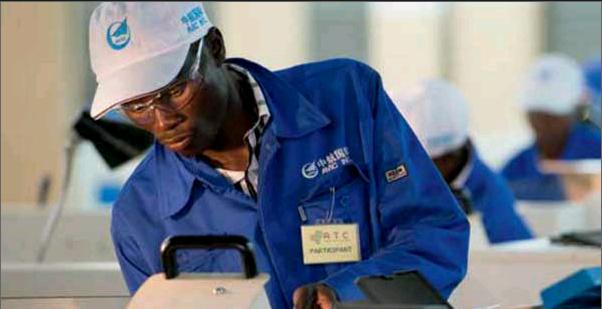Engineering Dreams
By+Li+Xiaoyu

Paul Mbutu Warutere used to work as a lowpaid tea picker on the outskirts of Nairobi in Kenya. He is now a graduate student at Beihang University(BUAA), a top-tier university of engineering science and technology in China. For Warutere, this life-changing shift all began with a competition.
Warutere always dreamed to become an engineer. In 2014, when he heard that a Chinese company was set to organize the Africa Tech Challenge (ATC) in Nairobi, through which participants were given access to advanced technical trainings, he knew this was his chance. He immediately quit his job and embarked on a journey that would forever transform his life.
Without much experience in advanced lathe operation, Warutere had to start from scratch. A two-month training taught him how to operate the machine tool and the practical skills needed to produce complex parts independently. His efforts paid well and earned him a runner up position in the finals and a scholarship to study at BUAA, one of the most prestigious engineering universities in China.
The top three finalists at the third ATC competition, held in late October, will be sponsored by Chinas AVIC International Holding Corp. to study at BUAA like Warutere. Together, they are the direct beneficiaries of a joint vocational education project of AVIC International and Kenyas Ministry of Education, Science and Technology (MEST).
Made in Africa
Waruteres life-changing opportunity was made possible by an agreement reached in January 2010 between AVIC International and MEST to upgrade the vocational education and training sector in the country.
According to Qi Lin, former Project Manager with AVIC International, the program was officially rolled out in early 2011 through supply of tailor-made Chinese advanced equipment, tools, and training materials to 10 universities and colleges in Kenya, while improving local management and teaching standards.
Despite initial enthusiasm, it was not long before problems began to surface. “On the one hand, those advanced equipment are not frequently used; on the other hand, Kenyan vocational training does not meet the requirements of local industrial enterprises, resulting in a high youth unemployment rate,” Qi told ChinAfrica.
The report Business Perception Index - Kenya 2014, conducted by the Kenya-based think tank Sino Africa Center of Excellence (SACE), supports Qis view. The report said that practical training only accounts for 20 percent of the daily teaching routine in Kenyan universities and colleges. Even graduates from top universities such as the University of Nairobi found themselves unable to operate advanced machinery when they entered the labor market due to an overfocus on textbooks and theoretical knowledge during their training.
To alleviate this problem, AVIC International and the MEST launched the first ATC competition in 2014, which aims to encourage more young people to embark upon a technical career path.
During the ATC, which is mainly focused on general lathe work, AVIC International first organizes training sessions for all participants, which are followed by competency-based tests. Once training is completed, participants take part in the actual machining competition.
This year marks the third time the ATC competition has been held, with a total of 238 participants from 87 universities and colleges in Kenya. This year, AVIC upgraded the challenge to the whole African continent, with teams from Uganda, Ghana and Zambia joining local students in the third ATC competition.
Zhao Leilei, Project Manager with AVIC International, said many candidates come with strong theoretical knowledge, but weak practical skills. “At first, they had no idea of how to operate the machine. After a series of intense training sessions, they have the proficiency of a mid-level worker in China, and will certainly be welcomed by potential employers.”
Following the competition, the top three finalists will not only be sponsored to study at Chinas top engineering universities and technical schools, but also be considered for internship and even employment opportunities at AVIC International. The most attractive element is that the university or college with the best team can receive a manufacturing order worth$100,000 from a Chinese factory.
“We are willing to breed a ‘made in Africa export to China brand, which will not only cultivate local enterprises confidence in the production ability of local universities and colleges, but also offer a chance for these universities and colleges to make full use of their existing equipment and technology to conduct cooperation with local enterprises,” said Qi.
New-type CSR
According to a SACEs survey of 75 Chinese enterprises operating in Kenya, they implement their corporate social responsibility (CSR) more passively than actively.
Through its positive commitment toward the ATC competition, AVIC International hopes to blaze a trail for others to follow in the region. “The novelty of our project is that we have both solved our shortage of local skilled manpower and helped the nation address its challenge of high unemployment rate,” said Qi.
At the closing ceremony of the third ATC competition, Kenyas Deputy President William Ruto said that professional training was crucial to the success of the countrys economic roadmap known as Vision 2030. He gave high praise to AVIC Internationals ATC program for training technicians, facilitating youth employment and helping transform the nations economy through technology transfer.
Long-term benefits
Qi believes that only continuous commitment and efforts in vocational education and training can yield substantial results.
“Initially, we thought that we could see results soon after arranging for teaching staff and putting equipment in place, but that was not the case. Vocational and technical training requires patience. It may take five or 10 years or even longer to take effect,” Qi told ChinAfrica.
In March 2016, AVIC International Chairman Wu Guangquan announced that his company will open 135 technical training institutions across Kenya within the next three years. “Once the institutions are set up, more than 50,000 students will be trained every year, giving a boost to Kenyas economic development,” said Wu.
He added that AVIC Internationals long-term plan is to expand vocational education programs across the continent. The company has already signed contracts or agreements with 13 African nations.

